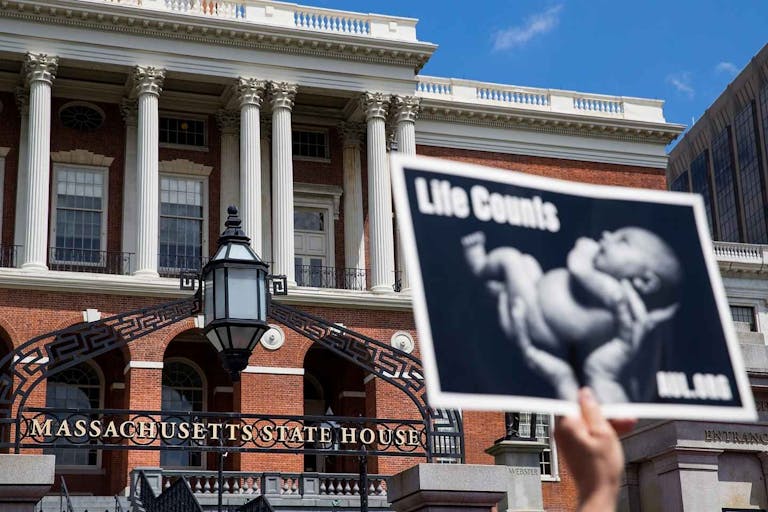
Massachusetts Health Department wants primary care to include abortion
Cassy Cooke
·
Pro-abortion groups claim the pro-life Mexico City Policy will harm women, but will it?
President Donald Trump reinstated the Mexico City Policy (or, as it is known by its opposition, the “Global Gag Rule”) on January 24 by Executive Order, requiring that no U.S. taxpayer funding be used toward abortions overseas. Immediately, pro-abortion groups claimed that lives that will be lost as a result.
As Lisa Correnti pointed out in a January 30 article for C-Fam, “The response from Democratic lawmakers and abortion proponents, though expected, includes false claims that the policy will have devastating effects throughout the developing world.”
Pro-abortion groups claim U.S. funding cuts lead to maternal deaths
The Chief Government & External Relations Officer for the Center for Reproductive Rights (CRR), Rachana Desai Martin, said, “The reinstatement and expansion of President Trump’s Global Gag Rule is a direct assault on the health and human rights of millions of people around the world,” according to Correnti’s report.
This is striking; CRR wants the public to believe that poisoning, suctioning, dismembering, and lethally injecting preborn children is ensuring “health” and is a global “human right” — and oh, by the way, the United States needs to pay for women all over the world to exercise that ‘right.’
Also included among the responses of abortion proponents were remarks from Dr. Carole Sekimpi, senior director for MSI Reproductive Choices (formerly Marie Stopes, a well-known global abortion corporation) in Africa, who asserted that “women’s and girls’ lives are being used as pawns in this political game.”
But who is using them as pawns, exactly? Correnti writes (emphases added):
Sekimpi complained that the loss of U.S. grant money prevented her organization from serving the needs of “8 million women, preventing 6 million unintended pregnancies, 1.8 million unsafe abortions, and 20,000 maternal deaths.”
Sekimpi did not acknowledge that MSI voluntarily forfeited funding, opting to prioritize abortion over delivering women’s healthcare.
MSI Reproductive Choices has pledged to fight back, sending an “unequivocal” message to President Trump — “we will never sign” an agreement not to promote or perform abortions.
‘If we can’t kill their preborn babies, then we refuse to help women at all’ doesn’t exactly scream ‘humanitarian.’ Nor does it show that you’re serious about addressing the actual health care needs of women, children, and families.
But the claim that women will die without abortion and abortion funding from the U.S. doesn’t hold water. A February 13 C-Fam article by Rebecca Oas, Ph.D. links to a February report (updated from a 2020 paper) authored by the Charlotte Lozier Institute, which states:
According to the United Nations Population Fund, there were approximately 287,000 maternal deaths in 2020. A 2014 study found that 52% of maternal deaths were attributable to one of the three leading causes of maternal deaths: hemorrhaging (the leading cause at 27%), hypertensive disorders, and sepsis; 28% of women died from indirect causes such as HIV. Only 8% of maternal deaths were attributable to abortion, a category that included miscarriage and ectopic pregnancy.
Deaths from both “safe” and “unsafe” abortion are known to be drastically undercounted. However, multiple studies from nations with national registries of pregnancy outcomes and deaths show that mortality is higher in the year following an abortion than following a birth, undermining claims that abortion access will lower maternal mortality.
Article continues below
Dear Reader,
In 2026, Live Action is heading straight where the battle is fiercest: college campuses.
We have a bold initiative to establish 100 Live Action campus chapters within the next year, and your partnership will make it a success!
Your support today will help train and equip young leaders, bring Live Action’s educational content into academic environments, host on-campus events and debates, and empower students to challenge the pro-abortion status quo with truth and compassion.
Invest in pro-life grassroots outreach and cultural formation with your DOUBLED year-end gift!

Enhancing credibility to lobby for more abortion
Unfortunately, many of the organizations tasked with providing actual health care are abortion organizations, which intentionally end the lives of human beings prior to birth, and — like MSI Reproductive Choices asserted — don’t intend to stop. Correnti noted that “global abortion groups like International Planned Parenthood Federation (IPPF) and others have moved into the humanitarian arena,” and Oas expounds upon this at C-Fam:
The largest organizations whose funding is blocked by the policy – the International Planned Parenthood Federation and MSI Reproductive Choices – not only provide abortion, but lobby foreign governments for more permissive laws and policies on abortion.
While they are already blocked from using U.S. funds to directly perform or promote abortion, the fungibility of money means that any U.S. aid they receive enables them to increase their foothold in countries and claim the enhanced credibility of being partners with the United States.
Lozier points out that under the Mexico City Policy (MCP), non-governmental organizations, or NGOs, must agree not to commit or promote abortions at all if they wish to continue receiving U.S. funding:
Under the MCP foreign NGOs must agree, as a condition of receiving U.S. funds, that they will neither perform nor actively promote abortion as a method of family planning with any source of funding, including non-U.S. funds. Before MCP and during periods in which it was not in effect, including the Biden administration, a foreign NGO could still receive U.S. funds for family planning if they used non-U.S. funds to engage in certain voluntary abortion-related activities using a segregated account for U.S. funds. The MCP does not permit this.
An organization which “actively promotes abortion as a method of family planning” means a commitment of “resources, financial or other, in a substantial or continuing effort to increase the availability or use of abortion as a method of family planning.” This includes advising women that abortion is an available option or encouraging them to consider it, operating a family planning center that advises or gives information on the benefits and availability of abortion, conducting campaigns to inform the public about the benefits or availability of abortion, or lobbying a government to legalize or make abortion available.
The MCP doesn’t apply in limited instances, such as when abortions are done for cases of rape or incest, or when injuries or emergency treatment is needed, including “post-abortion care.”
“Morally unacceptable”
The Lozier report noted that “abortion is not morally or culturally acceptable within the cultures of many countries, particularly in countries targeted by U.S. foreign aid,” and that refusing to contribute to aiding and abetting abortion in these countries can be “a boon for U.S. public diplomacy.” It also states that Pew Research from 2014 revealed that “in 26 out of 40 countries surveyed, the majority of respondents believe abortion is ‘morally unacceptable.'”
And yet, the abortion industry is quick to act as if killing is simply another part of humanitarian aid. IPPF has even called for “[s]exual and reproductive health and rights” to be “prioritized now” in a war-torn region of the world, “especially for women, girls, and the most vulnerable and marginalized groups among them, who have already been facing a protracted humanitarian crisis for decades.”
But in reality, using U.S. taxpayer funding to promote the killing of preborn children in foreign countries under the guise of humanitarian aid is a form of ideological colonization. As the Lozier report concludes, the Mexico City Policy is good for America, and good for the world, because it “decreases the amount of U.S. taxpayer dollars that are used for abortion-related services in foreign countries, redirecting U.S. aid to organizations providing necessary healthcare. At the same time, [it] directly reflects the desires of U.S. taxpayers, upholds international consensus on abortion, and respects the cultural values of the countries that U.S. foreign aid seeks to help.”
Live Action News is pro-life news and commentary from a pro-life perspective.
Contact editor@liveaction.org for questions, corrections, or if you are seeking permission to reprint any Live Action News content.
Guest Articles: To submit a guest article to Live Action News, email editor@liveaction.org with an attached Word document of 800-1000 words. Please also attach any photos relevant to your submission if applicable. If your submission is accepted for publication, you will be notified within three weeks. Guest articles are not compensated (see our Open License Agreement). Thank you for your interest in Live Action News!

Cassy Cooke
·
Issues
Bridget Sielicki
·
Issues
Nancy Flanders
·
International
Angeline Tan
·
International
Angeline Tan
·
International
Cassy Cooke
·
Human Interest
Kelli Keane
·
Activism
Kelli Keane
·
Politics
Kelli Keane
·
Human Interest
Kelli Keane
·
Abortion Pill
Kelli Keane
·